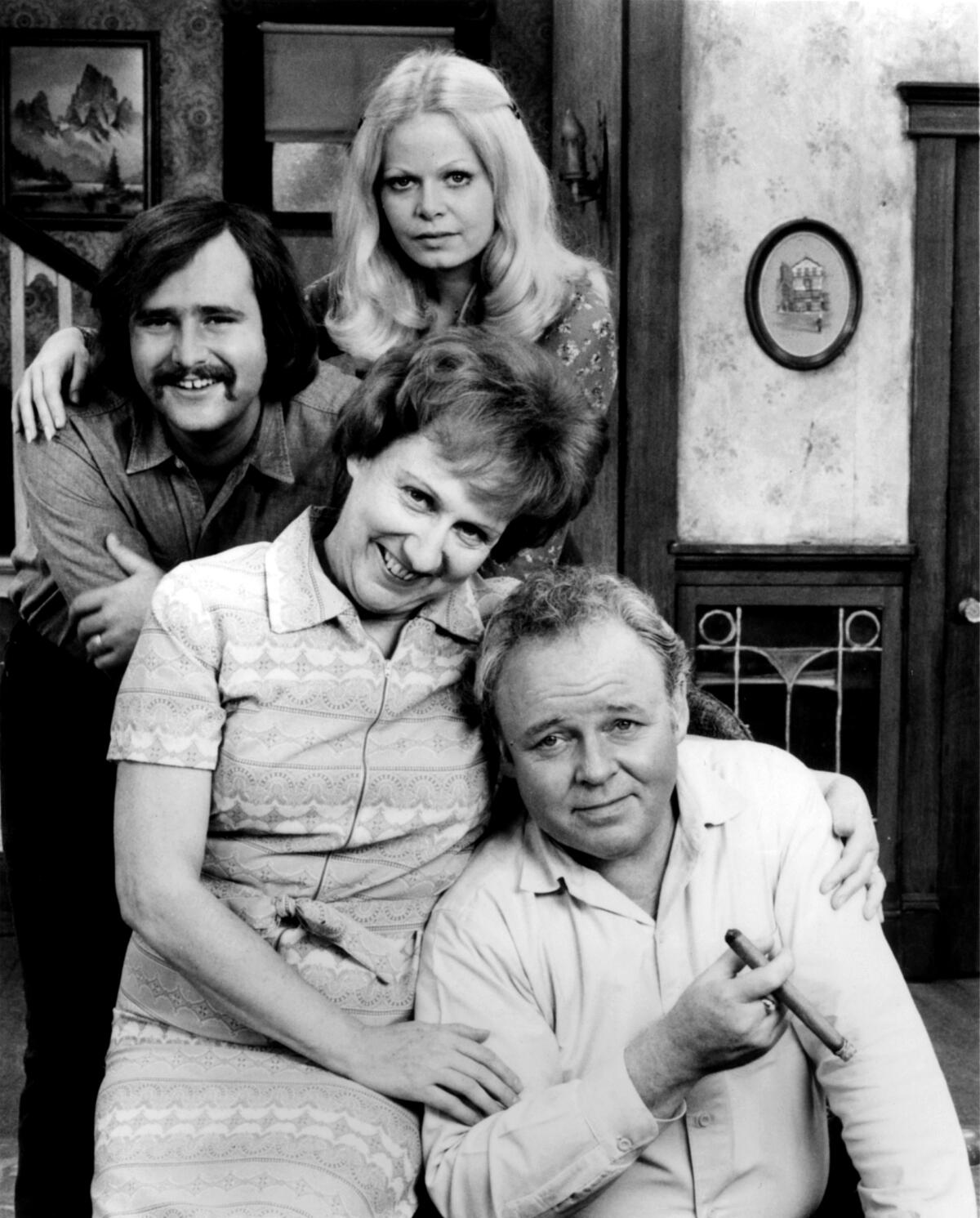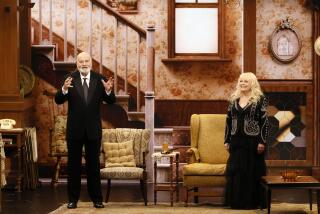Archie Bunker couldn’t exist today. That’s why we need him more than ever

- Share via
“Archie Bunker couldn’t exist today.”
It’s a refrain that’s landed in my inbox more than once since the death of “All in the Family” creator Norman Lear on Tuesday. The indelible character at the center of his half-hour comedy was most certainly the product of another time, but the reasons why folks believe the cantankerous, middle-aged font of grievances played by Carroll O’Connor would never make it on 21st century screens vary depending on their politics.
“The woke left would never allow a show like ‘All in the Family’ on the air now,” one of our readers wrote to me in an email. On the left, though, the common refrain is, “Why bother?” The right, they believe, would side with Archie while proclaiming that the show’s lampooning portrayal was just another example of liberal media bias.
But we need a common space like “All in the Family” today more than ever.
When Lear introduced the crass, unabashed bigot Archie to CBS prime-time audiences in 1971, he challenged the traditional treatment of conflict in a family sitcom by swapping out tame issues — “Beaver sent a baseball through the neighbor’s window!” “Jan is having another middle-child crisis!” — with debates about topical and often thorny issues. In his thick Queens, N.Y., accent, Archie endlessly grumbled about why the country was going down the “turlet”: Long-haired “idiots” opposing the Vietnam War. “Coloreds” (he also used worse words) moving into his neighborhood. “Loudmouth” feminists. Commies. Queers.
Even at the time, viewers on both sides of the political spectrum were shocked by the show’s candor. Progressives were disgusted by Archie’s racist, sexist rants. Conservatives saw him as a truth-teller who exemplified the ways in which Hollywood poked fun at dying American values. CBS foresaw the controversy and ran a disclaimer before the show aired: “The program you are about to see is ‘All in the Family.’ It seeks to throw a humorous spotlight on our frailties, prejudices, and concerns. By making them a source of laughter we hope to show, in a mature fashion, just how absurd they are.”
It’s that sort of dialogue that Lear relished, which is why more than 50 years ago he dropped his show into the crosshairs of a culture war, at the dawn of a new decade. “All in the Family” offered a window into America’s fears and divisions via one cramped household where the intensity always seemed to be dialed to 11. Archie’s son-in-law Michael (Rob Reiner) represented a wily, progressive changing of the guard. Wife Edith (Jean Stapleton) was the low-information, neutral voter. Edith’s cousin Maude (Bea Arthur) brought in a feminist perspective, and Black neighbor George Jefferson (Sherman Hemsley) schooled Archie on bigotry, often through his own disdain for “honkies.”
The argument over what Archie represents continues, now on social media and anywhere else warring factions in this divided nation scream at each other from the comfort of their respective silos. But if the show were made today, it’s easy to imagine Bunker’s laundry list of resentments — The Great Replacement, woke corporations, transgender athletes, electric stoves. In other words, it would sound like a half-hour in prime time on the Fox News Channel. He might defend his hateful screeds with a line that’s now used quite often by professional agitators: “I’m just saying what most people believe but are too cowardly to admit.”
The idea of gathering red and blue state viewers in one shared space now seems about as likely as Rachel Maddow and Tucker Carlson breaking bread. Back in March of 1972, it was reported that 60% of all television sets in America were tuned to “All in the Family” at 8 p.m. every Saturday. That meant that 50 million to 60 million viewers were watching in real time, and arguing it out on Monday morning around the water cooler, generating praise and protestations from progressives and conservatives alike.
People saw what they wanted in Bunker: a straight-talking everyman who represented the end of a great era, a post-civil rights racist whose time was up, or a thought-provoking combination of both. Even President Nixon was conflicted about the series. He was captured on an audio recording saying that he identified with the “hard hat” Archie, but complained that the show introduced “handsome” gay characters when he was watching, thereby glorifying homosexuality. “You know what happened to the Greeks. Homosexuality destroyed them.”
Today’s infinite-channel universe has atomized the TV audience, as has the tribal nature of the internet, partisan podcasts and fragmentation of the media in general. The idea of having a “national conversation” about anything is laughable. But the real-world consequence of such division isn’t as funny. Polarization has contributed to a lack of faith in leadership, mistrust in one another, and Washington’s inability to get much of anything done.
We could use “All in the Family” now, or another common playing field where the issues of the day are debated with candor, perhaps wrapped in a cocoon of humor to make it all feel a little less dangerous. Bunker’s lamenting of a golden yesteryear when “girls were girls and men were men” wasn’t a truth-telling moment. It was an opportunity for Americans to debate bigger, more fraught issues within the safety of a weekly sitcom. Those were the days.
More to Read
The biggest entertainment stories
Get our big stories about Hollywood, film, television, music, arts, culture and more right in your inbox as soon as they publish.
You may occasionally receive promotional content from the Los Angeles Times.











